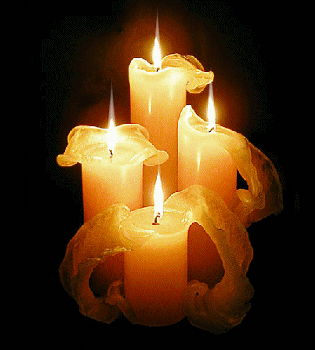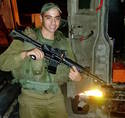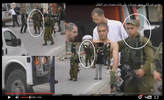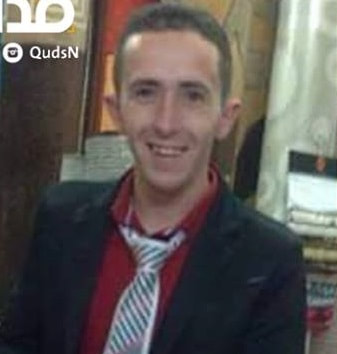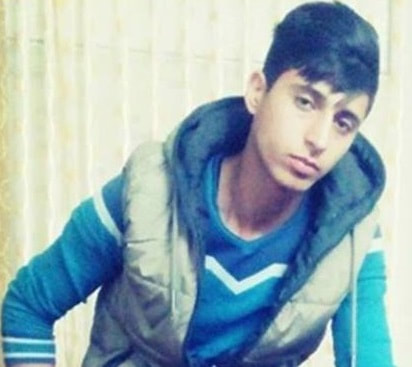30 mar 2016

US Senator Patrick Leahy together with US Secretary of State John Kerry
US Senator Patrick Leahy along with 10 other Democratic congressmen have called on the US to investigate the possibility of "gross violations of human rights" by Israel's and Egypt's security forces, including "extrajudicial killings."
Leahy, who has in the past sought a greater role for human rights in US foreign policy, made the request in a joint letter sent to US Secretary of State John Kerry on Feb. 17, suggesting that if the reports of rights violations should be proven, US military assistance should be cut off.
"There have been a disturbing number of reports of possible gross violations of human rights by security forces in Israel and Egypt -- incidents that may have involved recipients, or potential recipients, of US military assistance," the congressmen said in the letter published on Tuesday by Politico.
The letter cited findings by Amnesty International and other human rights organizations of "extrajudicial killings by the Israeli military and police of Fadi Alloun, Saad al-Atrash, Hadeel Hashlamoun, and Mutaz Ewisa," as well as several cases of torture.
"We urge you to determine if these reports are credible and to inform us of your findings," the congressmen said.
The letter went on to say they had received information that the usual mechanisms in determining the provision of US military assistance and monitoring its use had been "hindered" by a "unique situation" created since the Camp David Accords.
It suggested the US State Department and Department of Defense may be in breach of the Leahy Law -- a law named after the Vermont senator that prohibits the provision of military assistance to foreign military units that violate human rights with impunity.
If the reports were proven true, the congressmen said, the US should "take appropriate action called for under the law."
The letter also cited human rights violations carried out by the Egyptian army, including the 2013 massacre in Rabaa Square and a number of recently documented Egyptian "extrajudicial killings."
Every year, the US provides $3 billion worth of military assistance to Israel, and is currently negotiating a package for the next 10 years that is expected to see that amount increase. Hundreds of millions of dollars have also been provided to the Egyptian army since it toppled the nation's first democratically elected president in 2013.
The letter was sent before a soldier's gruesome killing of a wounded Palestinian in Hebron caused international outcry last week, an incident one senior UN official branded an "extrajudicial execution" and a "gruesome, immoral, and unjust act."
Israeli forces have faced repeated criticism for their excessive use of force against Palestinians since a wave of unrest swept Israel and the occupied Palestinian territory last October.
More than 200 Palestinians have now been shot dead by Israeli forces, some in clashes, the majority after they had been accused of attacking or attempting to attack Israelis, with nearly 30 Israelis killed in the same period.
However, human rights groups have repeatedly condemned Israeli forces for opening fire on Palestinians who posed no imminent danger, in killings they say amount to "extrajudicial executions."
US congressmen call on Kerry to probe Israeli 'extrajudicial executions'
In letter, Dem. Senator Patrick Leahy urges State Department to investigate allegations of 'gross violations of human rights' by Israel and Egypt, and reexamine military aid to the two countries.
US Democratic Senator Patrick Leahy and 10 other Democratic members of Congress have called on Secretary of State John Kerry to open an investigation against Israel on suspicion of "extrajudicial executions" of Palestinians in the West Bank, American news site Politico revealed on Wednesday.
In a letter dated February 17, the Congressmen compare what they refer to as "gross violations of human rights" in Israel to forced disappearances of people in Egypt, as well as the August 2013 massacre in Rabaa Square in Cairo, in which at least 1,000 supporters of ousted president Mohamed Morsi were murdered and nearly 4,000 others wounded by Egyptian security forces. The massacre on August 14, 2013 was described by Human Rights Watch as "one of the world’s largest killings of demonstrators in a single day in recent history.”
Prime Minister Benjamin Netanyahu responded to the letter, saying that "The IDF and the Israel Police do not engage in executions. Israel’s soldiers and police officers defend themselves and innocent civilians with the highest moral standards against bloodthirsty terrorists who come to murder them. Where is the concern for the human rights of the many Israelis who’ve been murdered and maimed by these savage terrorists? This letter should have been addressed instead to those who incite youngsters to commit cruel acts of terrorism.”
Yesh Atid leader MK Yair Lapid sent an urgent letter to Senate Democratic leader Harry Reid, calling on him to condemn the letter.
"When Israel is under attack, we expect our friends to stand by us. It is very unfortunate to see congressmen using the current wave of terrorist attacks to undermine Israel's national security and to call to stop the vital military aid to Israel," Lapid wrote to Reid.
Leahy is the author of the Leahy Law, which prohibits the US government from providing foreign military aid to governments that violate human rights. About 75 percent of all US foreign military aid goes to Israel and Egypt —Israel receives an annual sum of $3.1 billion, while Egypt gets $1.3 billion.
The letter could have political ramifications: The unusual choice to paint Israel with the same brush as Egypt could anger Israel's friends in Washington, who will not be happy to hear that the only democracy in the Middle East is being lumped together with Egypt, a notorious violator of human rights.
In Politico's estimation, the letter was leaked almost a month and a half after being sent because of the incident in Hebron last week, when an IDF soldier shot to death a Palestinian attacker who was lying wounded on the ground.
US Senator Patrick Leahy along with 10 other Democratic congressmen have called on the US to investigate the possibility of "gross violations of human rights" by Israel's and Egypt's security forces, including "extrajudicial killings."
Leahy, who has in the past sought a greater role for human rights in US foreign policy, made the request in a joint letter sent to US Secretary of State John Kerry on Feb. 17, suggesting that if the reports of rights violations should be proven, US military assistance should be cut off.
"There have been a disturbing number of reports of possible gross violations of human rights by security forces in Israel and Egypt -- incidents that may have involved recipients, or potential recipients, of US military assistance," the congressmen said in the letter published on Tuesday by Politico.
The letter cited findings by Amnesty International and other human rights organizations of "extrajudicial killings by the Israeli military and police of Fadi Alloun, Saad al-Atrash, Hadeel Hashlamoun, and Mutaz Ewisa," as well as several cases of torture.
"We urge you to determine if these reports are credible and to inform us of your findings," the congressmen said.
The letter went on to say they had received information that the usual mechanisms in determining the provision of US military assistance and monitoring its use had been "hindered" by a "unique situation" created since the Camp David Accords.
It suggested the US State Department and Department of Defense may be in breach of the Leahy Law -- a law named after the Vermont senator that prohibits the provision of military assistance to foreign military units that violate human rights with impunity.
If the reports were proven true, the congressmen said, the US should "take appropriate action called for under the law."
The letter also cited human rights violations carried out by the Egyptian army, including the 2013 massacre in Rabaa Square and a number of recently documented Egyptian "extrajudicial killings."
Every year, the US provides $3 billion worth of military assistance to Israel, and is currently negotiating a package for the next 10 years that is expected to see that amount increase. Hundreds of millions of dollars have also been provided to the Egyptian army since it toppled the nation's first democratically elected president in 2013.
The letter was sent before a soldier's gruesome killing of a wounded Palestinian in Hebron caused international outcry last week, an incident one senior UN official branded an "extrajudicial execution" and a "gruesome, immoral, and unjust act."
Israeli forces have faced repeated criticism for their excessive use of force against Palestinians since a wave of unrest swept Israel and the occupied Palestinian territory last October.
More than 200 Palestinians have now been shot dead by Israeli forces, some in clashes, the majority after they had been accused of attacking or attempting to attack Israelis, with nearly 30 Israelis killed in the same period.
However, human rights groups have repeatedly condemned Israeli forces for opening fire on Palestinians who posed no imminent danger, in killings they say amount to "extrajudicial executions."
US congressmen call on Kerry to probe Israeli 'extrajudicial executions'
In letter, Dem. Senator Patrick Leahy urges State Department to investigate allegations of 'gross violations of human rights' by Israel and Egypt, and reexamine military aid to the two countries.
US Democratic Senator Patrick Leahy and 10 other Democratic members of Congress have called on Secretary of State John Kerry to open an investigation against Israel on suspicion of "extrajudicial executions" of Palestinians in the West Bank, American news site Politico revealed on Wednesday.
In a letter dated February 17, the Congressmen compare what they refer to as "gross violations of human rights" in Israel to forced disappearances of people in Egypt, as well as the August 2013 massacre in Rabaa Square in Cairo, in which at least 1,000 supporters of ousted president Mohamed Morsi were murdered and nearly 4,000 others wounded by Egyptian security forces. The massacre on August 14, 2013 was described by Human Rights Watch as "one of the world’s largest killings of demonstrators in a single day in recent history.”
Prime Minister Benjamin Netanyahu responded to the letter, saying that "The IDF and the Israel Police do not engage in executions. Israel’s soldiers and police officers defend themselves and innocent civilians with the highest moral standards against bloodthirsty terrorists who come to murder them. Where is the concern for the human rights of the many Israelis who’ve been murdered and maimed by these savage terrorists? This letter should have been addressed instead to those who incite youngsters to commit cruel acts of terrorism.”
Yesh Atid leader MK Yair Lapid sent an urgent letter to Senate Democratic leader Harry Reid, calling on him to condemn the letter.
"When Israel is under attack, we expect our friends to stand by us. It is very unfortunate to see congressmen using the current wave of terrorist attacks to undermine Israel's national security and to call to stop the vital military aid to Israel," Lapid wrote to Reid.
Leahy is the author of the Leahy Law, which prohibits the US government from providing foreign military aid to governments that violate human rights. About 75 percent of all US foreign military aid goes to Israel and Egypt —Israel receives an annual sum of $3.1 billion, while Egypt gets $1.3 billion.
The letter could have political ramifications: The unusual choice to paint Israel with the same brush as Egypt could anger Israel's friends in Washington, who will not be happy to hear that the only democracy in the Middle East is being lumped together with Egypt, a notorious violator of human rights.
In Politico's estimation, the letter was leaked almost a month and a half after being sent because of the incident in Hebron last week, when an IDF soldier shot to death a Palestinian attacker who was lying wounded on the ground.
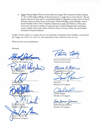
The letter
Leahy's spokesman David Carl downplayed the fact Israel was included in the letter, noting that Leahy believes that the law that bears his name "should be uniformly applied."
In their letter, the American lawmakers questioned the mechanism that monitors military assistance to Israel and Egypt and sought clarification on what procedures are used by the State Department and American embassies to investigate allegations of human right violations.
"According to information we have received, the manner in which US military assistance has been provided to Israel and Egypt, since the Camp David Accords, including the delivery of assistance at the military service level, has created a unique situation that has hindered implementation of normal mechanisms for monitoring the use of such assistance," the congressmen wrote.
The letter notes several cases of "extrajudicial execution" by the IDF and Israel Police, including that of Fadi Alloun, who stabbed an ultra-Orthodox teen in Jerusalem in October, and Hadeel Hashlamoun, an 18-year-old Palestinian girl who was shot to death at a checkpoint in Hebron after trying to stab a soldier.
The letter also cites allegation of torture against Palestinians, including 13-year-old Palestinian boy Ahmed Manasra who, along with another Palestinian teen, stabbed a 13-year-old boy and a 21-year-old man in Pisgat Ze'ev in Jerusalem.
In the past, Leahy unsuccessfully tried to include a clause in his law that would limit US aid to elite IDF units like Shayetet 13 because they "harm innocent Palestinians."
UN expert decries soldier's killing of neutralized Palestinian attacker
UN special rapporteur on extrajudicial executions says 'Whatever legal regime one applies to the case, shooting someone who is no longer a threat is murder.'
A UN expert on human rights on Wednesday condemned the killing by an IDF soldier of a wounded Palestinian assailant last week as he lay on the ground, saying it appeared to be an extrajudicial execution.
Video taken by the B'Tselem human rights NGO last Thursday shows an infantryman firing into the head of a Palestinian as he lay on the ground in Hebron in the West Bank. Minutes earlier, the Palestinian had stabbed and wounded another soldier.
The soldier has been arrested, though not yet charged. The military initially said it was a murder investigation, but on Tuesday prosecutors told a court they were looking into possible manslaughter charges.
The incident brought to a boil a debate in Israel over whether excessive force has been used against Palestinian assailants.
"The images shown carry all the signs of a clear case of an extrajudicial execution," said Christof Heyns, UN special rapporteur on extrajudicial, summary or arbitrary executions, of the Hebron shooting. "Whatever legal regime one applies to the case, shooting someone who is no longer a threat is murder."
On Thursday, an autopsy will be carried out on the Palestinian's body, with a Palestinian doctor present, and the findings could be key in determining the severity of charges to be brought against the soldier.
There is still a gag order regarding the soldier's identity.
The IDF chief on Wednesday sent out a letter to troops in which he said the army will support any soldier that makes a mistake in the heat of the battle, but at the same time it will hold accountable soldiers or commanders who do not adhere to the military's moral code.
The past six months has seen the worst period of sustained violence in the West Bank, Jerusalem and the Israeli interior since a Palestinian uprising ended a decade ago.
Leahy's spokesman David Carl downplayed the fact Israel was included in the letter, noting that Leahy believes that the law that bears his name "should be uniformly applied."
In their letter, the American lawmakers questioned the mechanism that monitors military assistance to Israel and Egypt and sought clarification on what procedures are used by the State Department and American embassies to investigate allegations of human right violations.
"According to information we have received, the manner in which US military assistance has been provided to Israel and Egypt, since the Camp David Accords, including the delivery of assistance at the military service level, has created a unique situation that has hindered implementation of normal mechanisms for monitoring the use of such assistance," the congressmen wrote.
The letter notes several cases of "extrajudicial execution" by the IDF and Israel Police, including that of Fadi Alloun, who stabbed an ultra-Orthodox teen in Jerusalem in October, and Hadeel Hashlamoun, an 18-year-old Palestinian girl who was shot to death at a checkpoint in Hebron after trying to stab a soldier.
The letter also cites allegation of torture against Palestinians, including 13-year-old Palestinian boy Ahmed Manasra who, along with another Palestinian teen, stabbed a 13-year-old boy and a 21-year-old man in Pisgat Ze'ev in Jerusalem.
In the past, Leahy unsuccessfully tried to include a clause in his law that would limit US aid to elite IDF units like Shayetet 13 because they "harm innocent Palestinians."
UN expert decries soldier's killing of neutralized Palestinian attacker
UN special rapporteur on extrajudicial executions says 'Whatever legal regime one applies to the case, shooting someone who is no longer a threat is murder.'
A UN expert on human rights on Wednesday condemned the killing by an IDF soldier of a wounded Palestinian assailant last week as he lay on the ground, saying it appeared to be an extrajudicial execution.
Video taken by the B'Tselem human rights NGO last Thursday shows an infantryman firing into the head of a Palestinian as he lay on the ground in Hebron in the West Bank. Minutes earlier, the Palestinian had stabbed and wounded another soldier.
The soldier has been arrested, though not yet charged. The military initially said it was a murder investigation, but on Tuesday prosecutors told a court they were looking into possible manslaughter charges.
The incident brought to a boil a debate in Israel over whether excessive force has been used against Palestinian assailants.
"The images shown carry all the signs of a clear case of an extrajudicial execution," said Christof Heyns, UN special rapporteur on extrajudicial, summary or arbitrary executions, of the Hebron shooting. "Whatever legal regime one applies to the case, shooting someone who is no longer a threat is murder."
On Thursday, an autopsy will be carried out on the Palestinian's body, with a Palestinian doctor present, and the findings could be key in determining the severity of charges to be brought against the soldier.
There is still a gag order regarding the soldier's identity.
The IDF chief on Wednesday sent out a letter to troops in which he said the army will support any soldier that makes a mistake in the heat of the battle, but at the same time it will hold accountable soldiers or commanders who do not adhere to the military's moral code.
The past six months has seen the worst period of sustained violence in the West Bank, Jerusalem and the Israeli interior since a Palestinian uprising ended a decade ago.
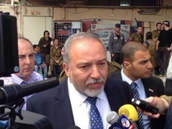
Israeli Foreign Minister and the head of “Israel Our Home” far-right fundamentalist party, Avigdor Lieberman, was among the hundreds of Israeli fanatics, protesting in front of the Military Court that was holding a hearing in the case of the soldier who was caught on tape executing a seriously wounded Palestinian, last Thursday in Hebron.
Lieberman and his supporters were protesting the arrest of the soldier, and described him as an "Israeli hero who was performing his duties."
The slain Palestinian has been identified as Abdul-Fattah Yosri Sharif, 21, another Palestinian, identified as Ramzi Aziz Qasrawi, 21, was instantly killed by the soldiers, allegedly after they both "attempted to stab soldiers."
"We came here to express our support and solidarity with the soldier," Lieberman said, "We are also here to condemn the rude meddling of Benjamin Netanyahu and the Defense Minister in this case."
Lieberman also stated that "it is unacceptable that a 19-year-old soldier is being attacked this way, even before an official investigation is concluded."
He claimed that he did not support the conduct of the soldier, but added that he prefers to see "a soldier who made a wrong judgement and remained alive, rather than seeing a soldier who remained hesitant and God forbid, got killed by terrorists."
"We came here to tell the court, and the government that this soldier cannot be charged with murder; they are trying to portray him as a criminal," Lieberman added, "Unfortunately, the Defense Minister is labeling him as a criminal, and that is why we are all protesting, and demanding his release."
Lieberman's statements contradict the facts on the ground, as the Palestinian was already completely incapacitated after his very serious injury, and posed no threat to any soldier or settler.
Israel is going after the soldier because the outrageous crime was captured on film by a Imad Abu Shamsiyya, Palestinian videographer and human rights worker whose video of the murder of a 21-year-old Palestinian, led to a number of death threats, as well as gatherings outside his home of Israeli settlers vowing to harm him, and has been told by the Israeli police and military that they will not protect him or his family from the settlers.
The video also clearly shows that the soldier did not act on his own, as other soldiers who were standing nearby, moved away to give him a clear shot to the head on the seriously wounded Palestinian.
Lieberman and his supporters were protesting the arrest of the soldier, and described him as an "Israeli hero who was performing his duties."
The slain Palestinian has been identified as Abdul-Fattah Yosri Sharif, 21, another Palestinian, identified as Ramzi Aziz Qasrawi, 21, was instantly killed by the soldiers, allegedly after they both "attempted to stab soldiers."
"We came here to express our support and solidarity with the soldier," Lieberman said, "We are also here to condemn the rude meddling of Benjamin Netanyahu and the Defense Minister in this case."
Lieberman also stated that "it is unacceptable that a 19-year-old soldier is being attacked this way, even before an official investigation is concluded."
He claimed that he did not support the conduct of the soldier, but added that he prefers to see "a soldier who made a wrong judgement and remained alive, rather than seeing a soldier who remained hesitant and God forbid, got killed by terrorists."
"We came here to tell the court, and the government that this soldier cannot be charged with murder; they are trying to portray him as a criminal," Lieberman added, "Unfortunately, the Defense Minister is labeling him as a criminal, and that is why we are all protesting, and demanding his release."
Lieberman's statements contradict the facts on the ground, as the Palestinian was already completely incapacitated after his very serious injury, and posed no threat to any soldier or settler.
Israel is going after the soldier because the outrageous crime was captured on film by a Imad Abu Shamsiyya, Palestinian videographer and human rights worker whose video of the murder of a 21-year-old Palestinian, led to a number of death threats, as well as gatherings outside his home of Israeli settlers vowing to harm him, and has been told by the Israeli police and military that they will not protect him or his family from the settlers.
The video also clearly shows that the soldier did not act on his own, as other soldiers who were standing nearby, moved away to give him a clear shot to the head on the seriously wounded Palestinian.
29 mar 2016
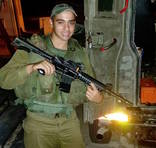
After popular protests and a prosecution which could not come up with any clear charges, the soldier who killed a neutralized terrorist in Hebron on Thursday will remain in remand for two days. The prosecution is expected to build its case during that period.
Military Judge Lt. Col. Ron Shorr, who is presiding the case of the soldier who killed a neutralized terrorist in Hebron on Thursday, said that "the evidence (that the soldier murdered the terrorist) provided until now is not clear cut."
The soldier's attorney, Ilan Katz, said that "the prosecution requested nine days of remand, but the judge ruled to extend his remand for only two more days despite the inflated claims of the prosecution. The military court will not drag our client through a media lynching. The evidence will be gone over on Thursday, and we hope that by the weekend, he will no longer walk around in handcuffs in such a humiliating manner, especially after he risked his life for Israel."
The soldiers other defense attorney, Binyamin Malka, said that "the decision speaks for itself. We will continue to work to prove our client's innocence, and stick to our position that the soldier acted correctly and as expected in light of the evidence."
The military prosecutors requested the extention of the soldier's remand by nine days, saying, "We have found contradictions in the suspect's testimony which require us to investigate further."
During the hearing, the prosecution refrained from saying what crime the solider is suspected of committing; only repeating again and again that what the soldier did was an "extreme transgression."
The chants and drumbeats of hundreds of supporters who came out for the soldier were heard inside the courtroom as the hearing began. Several politicians were at the show of support, including Avigdor Liberman, Moshe Feiglin, and Oren Hazan.
Prosecutor Rigler explained, "There is an alleged deviation from the commanders' orders, safety rules, and a deviation from the rules of engagement. The investigation being carried out by the Military Police investigators began after the commanders filed a report. From the first reports, there arose suspicion of a serious offense. The investigation collected videos and testimonies from the officers at the scene from before the shooting and during it. From the evidence it is clear that the suspect shot in the direction of the terrorist who was lying on the ground – after the terrorist was already shot by another soldier following the stabbing attack, although he was still alive. The suspect who is being investigated is the one who fired without any operational need."
The prosecution: "It doesn't look like the soldier was in danger"
According to the prosecution, several significant questions arose regarding the claim that the suspect acted out of a clear and present danger to his life.
"The questions come from several places: The way that the suspect acted in real time, as we can see in the videos which were collected. His behavior doesn't seem like the behavior of someone who's life is in danger. The suspect's statements which were said in real time, close to the time of firing, raise doubts as to his claim. The fire occurred several minutes after the two terrorists were lying on the ground after being shot by the first soldier."
One of the soldier's defense attorneys, Eyal Baserglick, asked if the terrorist was alive after the first bout of fire. The Police Investigator's representative answered "this is one of the reasons why we want to perform the autopsy. According to my understanding, in the entire investigation, not one doctor checked the body, but several of those interrogated did claim that the terrorist was still alive."
It was at this point when the prosecutor interjected and claimed that the evidence shows that the terrorist had signs of life when he was shot, and that video from the incident speaks for itself.
Ilan Katz replied that "the investigative and judiciary authorities of the state of israel are subject to the same norms and regulations. It cannot be that what a soldier does can be seen as worse than what a police officer or a prison guard does. There have been several instances just recently where a suspect discharged a weapon illegally, and people were freed, or at least not arrested – like in the inident in Jaffa."
"The soldier was in a situation where his comrades were in real danger, in danger of losing their lives," the defense attorney said, "This was a terror event and the prosecution cannot deny it, especially due to the fact that there was a terrorist, and that they didn't let them get close to him because there was a suspicion that he had a bomb."
Hundreds of protesters in support of the soldier
MK Avigdor Liberman said at the end of the hearing that "the military prosecutors' case fell to pieces. There isn't even a charge."
Liberman described what occurred as an "absurd spectacle," and accused the Minister of defense as being "absolutely terrible – a military investigator said that he is forbidden from seeing the findings of the operational investigation which just yesterday Ya'alon elaborated on from the Knesset podium. I don’t trust Ya'alon. Against the law and against orders, he detailed the findings of the investigation, and involved himself in the legal proceedings. Ya'alon also committed a grave offense, and is now trying to save himself."
On the heels of the storm of public criticism due to the hearing, hundreds of supporters of the soldier protested outside of the courthouse. There was even a group of Beitar Jerusalem fans who came, who called for "the release of the hero." At one point, a drum was taken from them, and chaos ensued.
Protestors who arrived from Rishon LeZion said "what is happening to the boy and to his parents hurts us. We are former IDF women, I served 22 years. But they're doing an injustice to this boy. They wouldn't even do this to someone who shoots at a girl in a central bus station (referring to this incident in Afula). Why are they doing this to him? They didn't even investigate anything. Those people come with knives in order to kill, so what should we expect?"
On Friday, the day of the initial arrest, the prosecutor announced at the Military Court in Jaffa that the soldier in question was under suspicion of murder. He was quoted as saying that he believed that the terrorist was wearing an explosive vest and might activate it. However, IDF claims that both of the terrorists were checked after being neutralized.
Military Judge Lt. Col. Ron Shorr, who is presiding the case of the soldier who killed a neutralized terrorist in Hebron on Thursday, said that "the evidence (that the soldier murdered the terrorist) provided until now is not clear cut."
The soldier's attorney, Ilan Katz, said that "the prosecution requested nine days of remand, but the judge ruled to extend his remand for only two more days despite the inflated claims of the prosecution. The military court will not drag our client through a media lynching. The evidence will be gone over on Thursday, and we hope that by the weekend, he will no longer walk around in handcuffs in such a humiliating manner, especially after he risked his life for Israel."
The soldiers other defense attorney, Binyamin Malka, said that "the decision speaks for itself. We will continue to work to prove our client's innocence, and stick to our position that the soldier acted correctly and as expected in light of the evidence."
The military prosecutors requested the extention of the soldier's remand by nine days, saying, "We have found contradictions in the suspect's testimony which require us to investigate further."
During the hearing, the prosecution refrained from saying what crime the solider is suspected of committing; only repeating again and again that what the soldier did was an "extreme transgression."
The chants and drumbeats of hundreds of supporters who came out for the soldier were heard inside the courtroom as the hearing began. Several politicians were at the show of support, including Avigdor Liberman, Moshe Feiglin, and Oren Hazan.
Prosecutor Rigler explained, "There is an alleged deviation from the commanders' orders, safety rules, and a deviation from the rules of engagement. The investigation being carried out by the Military Police investigators began after the commanders filed a report. From the first reports, there arose suspicion of a serious offense. The investigation collected videos and testimonies from the officers at the scene from before the shooting and during it. From the evidence it is clear that the suspect shot in the direction of the terrorist who was lying on the ground – after the terrorist was already shot by another soldier following the stabbing attack, although he was still alive. The suspect who is being investigated is the one who fired without any operational need."
The prosecution: "It doesn't look like the soldier was in danger"
According to the prosecution, several significant questions arose regarding the claim that the suspect acted out of a clear and present danger to his life.
"The questions come from several places: The way that the suspect acted in real time, as we can see in the videos which were collected. His behavior doesn't seem like the behavior of someone who's life is in danger. The suspect's statements which were said in real time, close to the time of firing, raise doubts as to his claim. The fire occurred several minutes after the two terrorists were lying on the ground after being shot by the first soldier."
One of the soldier's defense attorneys, Eyal Baserglick, asked if the terrorist was alive after the first bout of fire. The Police Investigator's representative answered "this is one of the reasons why we want to perform the autopsy. According to my understanding, in the entire investigation, not one doctor checked the body, but several of those interrogated did claim that the terrorist was still alive."
It was at this point when the prosecutor interjected and claimed that the evidence shows that the terrorist had signs of life when he was shot, and that video from the incident speaks for itself.
Ilan Katz replied that "the investigative and judiciary authorities of the state of israel are subject to the same norms and regulations. It cannot be that what a soldier does can be seen as worse than what a police officer or a prison guard does. There have been several instances just recently where a suspect discharged a weapon illegally, and people were freed, or at least not arrested – like in the inident in Jaffa."
"The soldier was in a situation where his comrades were in real danger, in danger of losing their lives," the defense attorney said, "This was a terror event and the prosecution cannot deny it, especially due to the fact that there was a terrorist, and that they didn't let them get close to him because there was a suspicion that he had a bomb."
Hundreds of protesters in support of the soldier
MK Avigdor Liberman said at the end of the hearing that "the military prosecutors' case fell to pieces. There isn't even a charge."
Liberman described what occurred as an "absurd spectacle," and accused the Minister of defense as being "absolutely terrible – a military investigator said that he is forbidden from seeing the findings of the operational investigation which just yesterday Ya'alon elaborated on from the Knesset podium. I don’t trust Ya'alon. Against the law and against orders, he detailed the findings of the investigation, and involved himself in the legal proceedings. Ya'alon also committed a grave offense, and is now trying to save himself."
On the heels of the storm of public criticism due to the hearing, hundreds of supporters of the soldier protested outside of the courthouse. There was even a group of Beitar Jerusalem fans who came, who called for "the release of the hero." At one point, a drum was taken from them, and chaos ensued.
Protestors who arrived from Rishon LeZion said "what is happening to the boy and to his parents hurts us. We are former IDF women, I served 22 years. But they're doing an injustice to this boy. They wouldn't even do this to someone who shoots at a girl in a central bus station (referring to this incident in Afula). Why are they doing this to him? They didn't even investigate anything. Those people come with knives in order to kill, so what should we expect?"
On Friday, the day of the initial arrest, the prosecutor announced at the Military Court in Jaffa that the soldier in question was under suspicion of murder. He was quoted as saying that he believed that the terrorist was wearing an explosive vest and might activate it. However, IDF claims that both of the terrorists were checked after being neutralized.
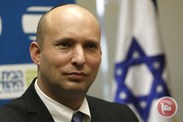
Israeli leaders have become embroiled in a growing political row over an Israeli soldier's gruesome killing of a wounded Palestinian in Hebron last week in a debate that has been largely steered by the far-right.
The political storm follows the release of video footage capturing the moment a soldier stepped forward and shot in the head Abed al-Fattah al-Sharif, a Palestinian who had already been shot and severely wounded after allegedly stabbing an Israeli soldier.
The killing sparked international outcry, with a senior UN official branding it an "extrajudicial execution" and a "gruesome, immoral, and unjust act that can only fuel more violence and escalate an already volatile situation."
However, while Israel's political establishment at first roundly denounced the killing, its leaders have since become locked in a growing debate in which many have wished to be seen voicing the loudest support for Israel's armed forces.
Prime Minister Benjamin Netanyahu initially condemned the killing, which he said did "not represent the values of the IDF (Israeli Defense Forces)," suggesting the soldier had behaved neither "level-headedly" nor "in accordance with the rules of engagement."
By Sunday, however, he seemed to be backtracking on his remarks, saying he was certain the army's investigation into the killing would consider the fact that Israeli soldiers fight "bloodthirsty murderers under difficult operational conditions."
Netanyahu appeared in part to be responding to Israeli media pressure, which has given voice to the soldier's claims he felt threatened by the severely wounded Palestinian, even though he had been lying on the ground supine more than 10 minutes before the soldier killed him.
But much of the debate has been brought on by Israeli Education Minister Naftali Bennett, head of the far-right Jewish Home party, who quickly offered his support to the family of the soldier, who he described as "outstanding."
At the weekly Cabinet meeting, Netanyahu and Bennett came head-to-head, with Bennet saying the soldier's murder charge was "outrageous," and he had been convicted by Israel's political establishment before he had faced a thorough investigation.
"We are at war against murderous Palestinian terror. At the forefront stands the soldier, and we face a test," he was quoted as telling the Cabinet in Israeli daily Haaretz. "Why was the soldier taken off in handcuffs? What message does that send to soldiers?"
Other ministers defended their condemnations, with Interior Minister Arye Dery saying it was important to investigate the killing "seriously" because Israel was in a public relations "war" with the Palestinians, Haaretz reported.
However, Netanyahu quickly rose to Bennett's challenge, seeking to be seen as the greater ally of Israel's army. "I always back up IDF soldiers," he reportedly told the education minister. "I have always given support to soldiers and have led more soldiers into battle than you. Don't preach to me about supporting IDF soldiers."
The debate found its way into the Knesset on Monday, where Defense Minister Moshe Yaalon denounced Bennett for phoning the family of the soldier "in order to show encouragement and support," a Knesset press release said.
"This was an incident of a soldier who had transgressed, and not a hero," Yaalon told the parliament. "Do you want a brutish army with no moral backbone?"
In response, Bennett later told the Knesset he had spoken not just once with the family of the soldier but "a number of times."
"Suddenly we cannot talk to the wonderful family of an outstanding soldier?" he was quoted in a Knesset press release. "Have we lost it? We send our children to protect us. We are talking about a battlefield, not some sterile media studio."
Palestinians and rights groups have stressed that the Hebron killing captured on camera last week was not an isolated incident, but representative of Israeli army practices common since a wave of knife attacks began last October.
On Monday, the Palestinian leadership requested that the UN open an investigation into Israel's "extrajudicial executions," with PLO official Saeb Erekat saying: "These executions are not isolated events and Israel must be held accountable for committing these crimes."
In Israel, meanwhile, Haaretz columnist Anshel Pfeffer noted that outside of foreign officials and diplomats, the killing had largely passed unnoticed by the international community.
"You would have expected the killing of Sharif to be headline news around the world," he wrote, "not only an internal debate over the battlefield morals of the Israel Defense Forces."
IDF reviews protocol with combat soldiers
IDF commanders tell soldiers in discussions this week that they must maintain a radius of 25 meters from 'potential threats'; commanders also said opening fire on terrorist wearing explosive belt could cause it to detonate.
West Bank commanders have emphasized IDF protocol obligating soldiers to maintain a 25 meter radius from "potential threats", such as a terrorist lying on the ground and is suspected of carrying an explosive device. This comes in the wake of the shooting incident, in which a Kfir Brigade soldier opened fire on a neutralized terrorist in Hebron.
During the past week, West Bank commanders have had conversations with soldiers following the disputed incident at a checkpoint in the Tel Rumeida neighborhood of Hebron. The commanders explained to soldiers that what the arrested solider did constitutes a legal and moral failure and a violation of protocol, which could have put his fellow soldiers at risk.
According to military protocol, when there is a fear of a terrorist wearing an explosive belt, forces nearby are obligated to maintain a 25 meter distance and warn others nearby because firing at the terrorist could detonate the explosive and severely injure nearby soldiers.
In combat medic courses, which the arrested soldier took, instructors teach that a bullet entering one's body can exit elsewhere, potentially detonating an explosive. Moreover, such a concern is still relevant even the soldier shoots the terrorist in the head.
"We receive these orders in briefings before carrying out (missions)." a Kfir Brigade soldier told Ynet. "The (commanders) are telling us that it is better to neutralize without killing for intelligence purposes and to prevent (public) discontent."
Another soldier noted, "It pains us to see our fellow soldier wounded and another now entangled in a complicated situation. Ironically we are one of the most experienced brigades in the West Bank because we have been in the army for a year and eight months."
The political storm follows the release of video footage capturing the moment a soldier stepped forward and shot in the head Abed al-Fattah al-Sharif, a Palestinian who had already been shot and severely wounded after allegedly stabbing an Israeli soldier.
The killing sparked international outcry, with a senior UN official branding it an "extrajudicial execution" and a "gruesome, immoral, and unjust act that can only fuel more violence and escalate an already volatile situation."
However, while Israel's political establishment at first roundly denounced the killing, its leaders have since become locked in a growing debate in which many have wished to be seen voicing the loudest support for Israel's armed forces.
Prime Minister Benjamin Netanyahu initially condemned the killing, which he said did "not represent the values of the IDF (Israeli Defense Forces)," suggesting the soldier had behaved neither "level-headedly" nor "in accordance with the rules of engagement."
By Sunday, however, he seemed to be backtracking on his remarks, saying he was certain the army's investigation into the killing would consider the fact that Israeli soldiers fight "bloodthirsty murderers under difficult operational conditions."
Netanyahu appeared in part to be responding to Israeli media pressure, which has given voice to the soldier's claims he felt threatened by the severely wounded Palestinian, even though he had been lying on the ground supine more than 10 minutes before the soldier killed him.
But much of the debate has been brought on by Israeli Education Minister Naftali Bennett, head of the far-right Jewish Home party, who quickly offered his support to the family of the soldier, who he described as "outstanding."
At the weekly Cabinet meeting, Netanyahu and Bennett came head-to-head, with Bennet saying the soldier's murder charge was "outrageous," and he had been convicted by Israel's political establishment before he had faced a thorough investigation.
"We are at war against murderous Palestinian terror. At the forefront stands the soldier, and we face a test," he was quoted as telling the Cabinet in Israeli daily Haaretz. "Why was the soldier taken off in handcuffs? What message does that send to soldiers?"
Other ministers defended their condemnations, with Interior Minister Arye Dery saying it was important to investigate the killing "seriously" because Israel was in a public relations "war" with the Palestinians, Haaretz reported.
However, Netanyahu quickly rose to Bennett's challenge, seeking to be seen as the greater ally of Israel's army. "I always back up IDF soldiers," he reportedly told the education minister. "I have always given support to soldiers and have led more soldiers into battle than you. Don't preach to me about supporting IDF soldiers."
The debate found its way into the Knesset on Monday, where Defense Minister Moshe Yaalon denounced Bennett for phoning the family of the soldier "in order to show encouragement and support," a Knesset press release said.
"This was an incident of a soldier who had transgressed, and not a hero," Yaalon told the parliament. "Do you want a brutish army with no moral backbone?"
In response, Bennett later told the Knesset he had spoken not just once with the family of the soldier but "a number of times."
"Suddenly we cannot talk to the wonderful family of an outstanding soldier?" he was quoted in a Knesset press release. "Have we lost it? We send our children to protect us. We are talking about a battlefield, not some sterile media studio."
Palestinians and rights groups have stressed that the Hebron killing captured on camera last week was not an isolated incident, but representative of Israeli army practices common since a wave of knife attacks began last October.
On Monday, the Palestinian leadership requested that the UN open an investigation into Israel's "extrajudicial executions," with PLO official Saeb Erekat saying: "These executions are not isolated events and Israel must be held accountable for committing these crimes."
In Israel, meanwhile, Haaretz columnist Anshel Pfeffer noted that outside of foreign officials and diplomats, the killing had largely passed unnoticed by the international community.
"You would have expected the killing of Sharif to be headline news around the world," he wrote, "not only an internal debate over the battlefield morals of the Israel Defense Forces."
IDF reviews protocol with combat soldiers
IDF commanders tell soldiers in discussions this week that they must maintain a radius of 25 meters from 'potential threats'; commanders also said opening fire on terrorist wearing explosive belt could cause it to detonate.
West Bank commanders have emphasized IDF protocol obligating soldiers to maintain a 25 meter radius from "potential threats", such as a terrorist lying on the ground and is suspected of carrying an explosive device. This comes in the wake of the shooting incident, in which a Kfir Brigade soldier opened fire on a neutralized terrorist in Hebron.
During the past week, West Bank commanders have had conversations with soldiers following the disputed incident at a checkpoint in the Tel Rumeida neighborhood of Hebron. The commanders explained to soldiers that what the arrested solider did constitutes a legal and moral failure and a violation of protocol, which could have put his fellow soldiers at risk.
According to military protocol, when there is a fear of a terrorist wearing an explosive belt, forces nearby are obligated to maintain a 25 meter distance and warn others nearby because firing at the terrorist could detonate the explosive and severely injure nearby soldiers.
In combat medic courses, which the arrested soldier took, instructors teach that a bullet entering one's body can exit elsewhere, potentially detonating an explosive. Moreover, such a concern is still relevant even the soldier shoots the terrorist in the head.
"We receive these orders in briefings before carrying out (missions)." a Kfir Brigade soldier told Ynet. "The (commanders) are telling us that it is better to neutralize without killing for intelligence purposes and to prevent (public) discontent."
Another soldier noted, "It pains us to see our fellow soldier wounded and another now entangled in a complicated situation. Ironically we are one of the most experienced brigades in the West Bank because we have been in the army for a year and eight months."
